COMPLETE
KEY for Schools
Student’s Book without answers
Second edition
WITH ONLINE PRACTICE
David McKeegan
For the revised exam from 2020

Student’s Book without answers
Second edition
WITH ONLINE PRACTICE
David McKeegan
For the revised exam from 2020







Match the sports with the photos. badminton basketball football judo table tennis



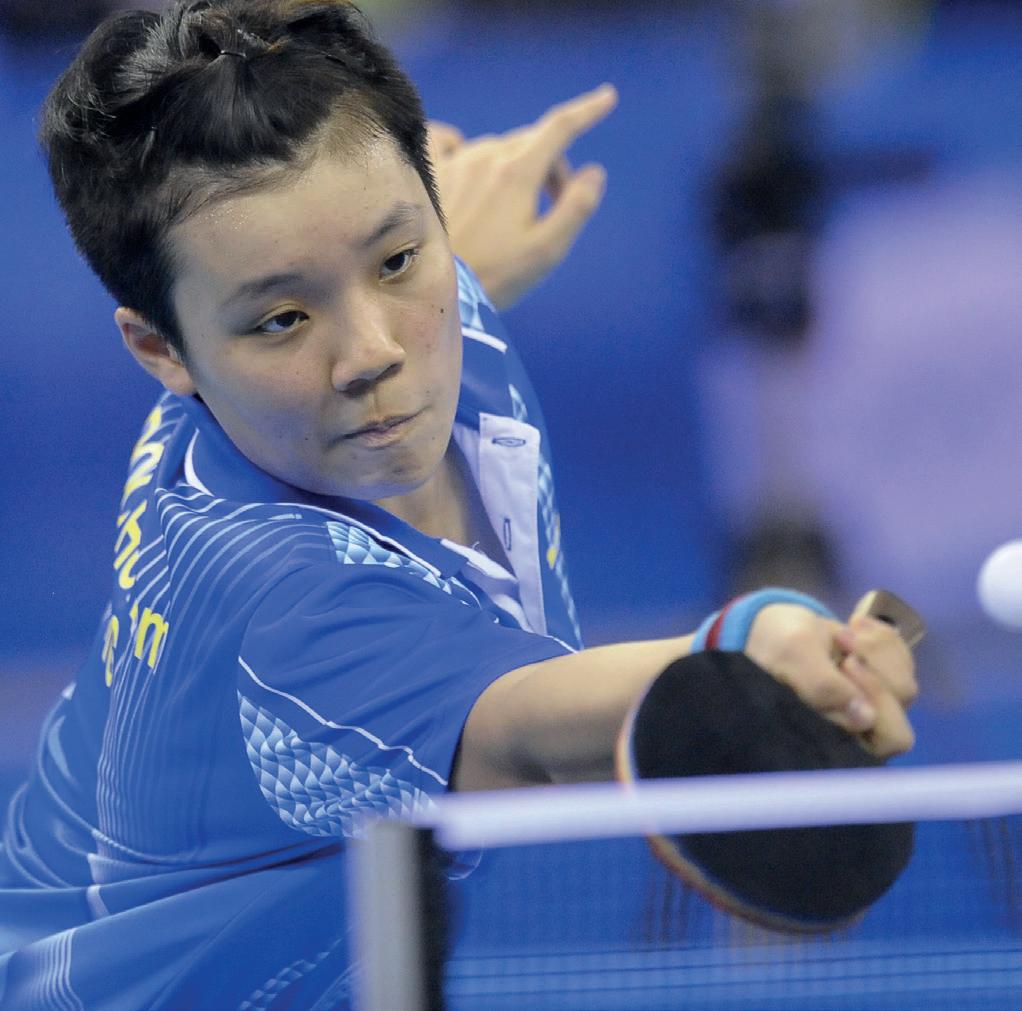




Work in pairs. Do you know the English words for any other sports? Make a list.







Tom is interviewing people about sports. Listen and complete the table with the person’s favourite.








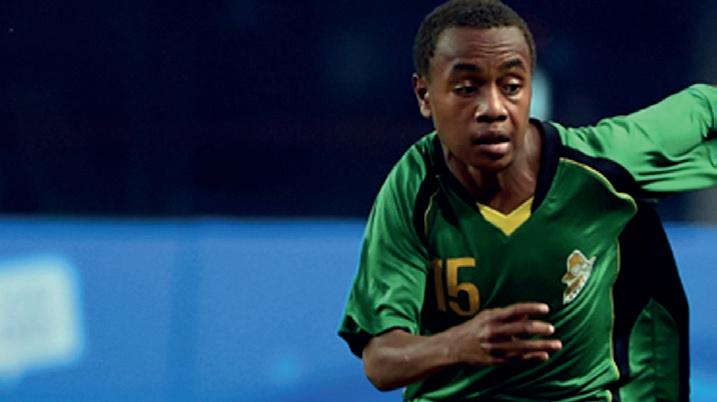



Work in pairs. What is your favourite sport? Why? Where do you play it? How often do you play?



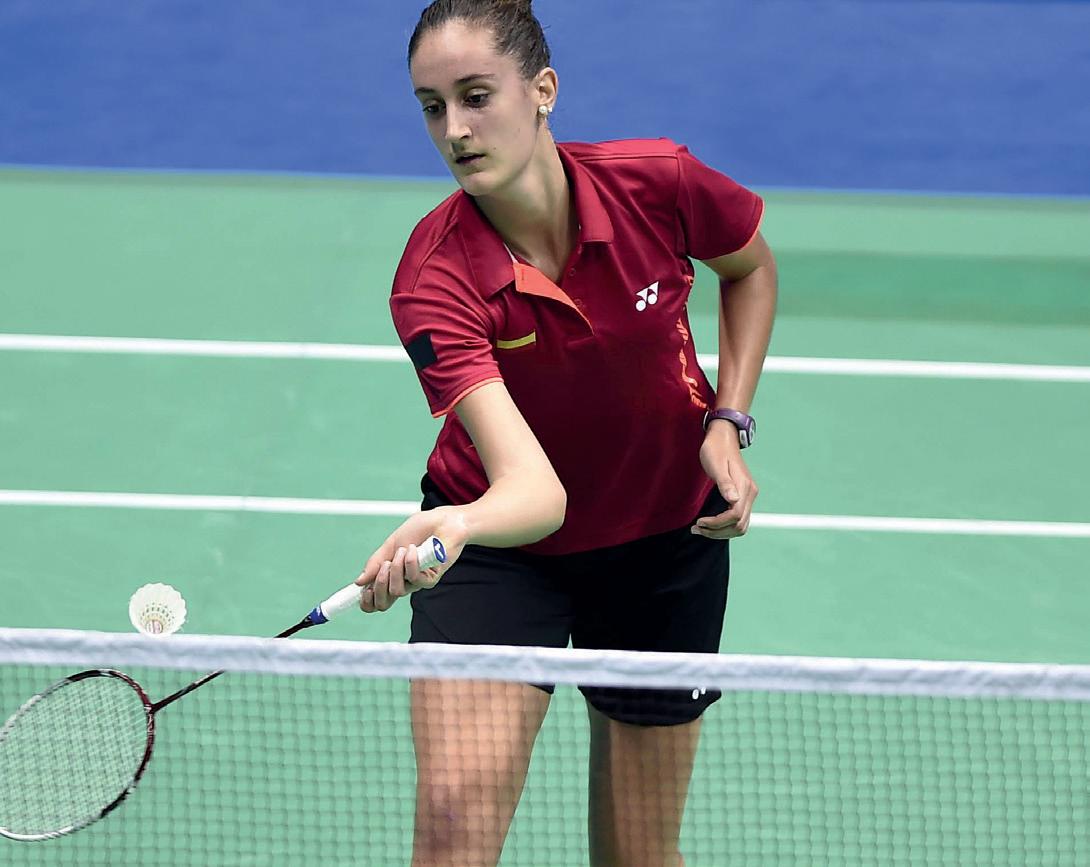
• Read the title and look at any pictures to get an idea of what the text is about.
• Then read the text carefully
Complete the conversation between Chris and Sally with words from the box. Listen and check.
Look at
definition of train. Do you train? What sport do you train for?
train / treɪn / verb SPORT [I, T] to practise a sport or exercise, often to prepare for a competition
Look at the photo of a gymnast. Do you like watching gymnastics? Do you do gymnastics in school?

Read the interview. For each question, choose the correct answer.
1 Joanna enjoys running in the morning because she likes to
A get up early.
B talk with her friends.
C be alone in the morning.
2 How does Joanna feel about training at the gym?

A She’s worried about the number of hours she spends there.
B She’s pleased she does a variety of activities there.
C She’s glad she doesn’t need to go there every day.
3 What does Joanna say about school?
A She has too much work to do.
B She doesn’t like her teachers.
C It’s a pity that she can’t go more often.
4 What does Joanna say about her family?
A They enjoy spending time together.
B They all like sport.
C They help with her homework.
5 Where does she usually meet her friends?
A At the bus stop.
B In town.
C In a café.
Do you have to train a lot, Joanna?
Yes! I usually get up at 6 o’clock and go running. I don’t run with my friends. It’s great to have some time to myself in the morning. After that, I have breakfast. Then Dad takes me to the gym. I train for 20 hours over six days and rest on Sunday. I often spend full days at the gym. I do different things there. Sometimes I dance or do other exercises. I like it because every day there’s something different to do.
Is it difficult to do your school work as well?
Yes, it is. My teachers are lovely and they know the situation. It’s true that I’m not at school every day. But I try to do as much work as I can. I’m sad that I can’t spend more time with my classmates. They’re fun.
best better cooler faster harder interesting popular
Chris: Why do you like football so much? Basketball is (1) !
Sally: No, it isn’t. Football is the (2) game in the world.
Chris: But basketball is (3) and more exciting.
Sally: You’re joking! Football is a much more (4) game than basketball.
Chris: Ha ha! Why do so many football games finish 0–0?
Sally: Because scoring a goal is (5) than scoring a basket.
Chris: In basketball, they often score more than 60 points in one game!

Sally: Yes, I know. But football is the most (6) game in the world.
Chris: I don’t understand why! Basketball is (7)
What do you do in your free time?
I love being with my family. My brother also does sport – for him it’s football – but we both have Sunday afternoons free. So we often go for picnics with Mum and Dad in the mountains near my home. We also like watching TV together, and of course, I always have homework to do.
Tell us more about the things you like.
My friends and I like shopping! I live in a village, so I get the bus to town and meet them there. Then we visit our favourite shops and we usually have a hot chocolate.
Match the rules (1–2) with the examples (a–b).
1 We can use comparatives to compare one person or thing to another.
2 We can use superlatives to compare one person or thing to everything in its group.
a Football is the best game in the world.
b Scoring a goal is harder than scoring a basket.
Exam candidates often make mistakes with comparatives and superlatives. Correct the mistakes in each of these sentences. the most
1 Rugby is the more exciting sport for me.
2 We can go to the sports centre by car because it’s more fast.
3 I liked the tennis match because it was between the better players in the world.
4 Jo is slowest runner in the class.
5 Football is the sport most popular in the world –everybody likes it.
6 Snowboarding is more easier to learn than windsurfing.
Listen to these sentences. Notice the schwa /ə/ sound in the underlined letters. Then listen and repeat again. Basketball is better.
Scoring a goal is harder than scoring a basket.
Underline the schwa /ə/ sound in these sentences. Listen and check.
1 I’m a faster runner than your brother.
2 Mike is a better basketball player than me.
Work in pairs. Think of your favourite things. Then say why you think your favourites are better than your partner’s.
book sport sports team school subject
TV show singer
What is your favourite school subject?
Match the sentences (1–3) with the photos (A–C).
1 We play cricket in the summer.
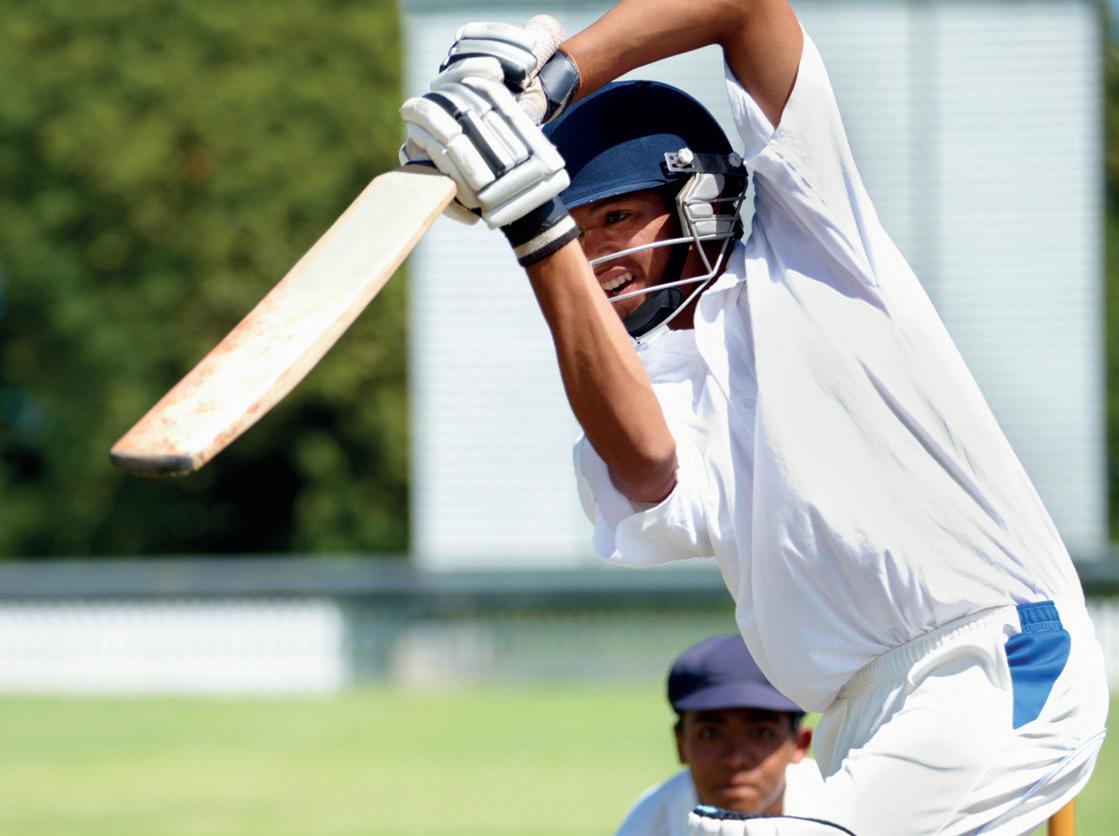
2 They’re doing karate.

3 She goes climbing every weekend.

English. It’s easier than maths!
Maths. I think it’s easy. What is your favourite?
For me, maths is the easiest subject!
Look at the table. Then complete the rules. play do go cricket hockey karate gymnastics climbing skating
1 We use with ball games and team sports.
2 We use with sports and activities ending in -ing.
3 We use with non-team sports and activities.
Put these sports and activities in the correct column in the table in Exercise 2.
baseball judo running surfing volleyball yoga
Work in pairs. Ask your partner what sports they do.
Do you play football?
Yes, I do. I train on Wednesday and play on Sunday.
Listen to the conversation. Answer the questions.
1 Who says the word comfortable?
2 Does anyone like the colour very much?
3 What are the shoes for?

Do you do yoga?
Which is your favourite sport?
No, I don’t. My mum does yoga on Saturdays with her friends. Running, because it’s cheaper than other sports. What about you?
• You will hear five short monologues or conversations.
• There is a question for each conversation.
• You have to choose the best answer.
Look at the first question and underline the key words.
1 You will hear a girl talking to her friend about a pair of shoes. Why does she buy them?
A Because they are comfortable.
B Because she likes the colour.
C Because they are good for sports.
Listen again. Choose the correct answer in Exercise 1 (A, B or C).
Underline the key words in questions 2–5. Listen, and for these questions, choose the correct answer.
2 You will hear a football manager talking to his team at half-time. What does he want them to do?
A Keep the ball for longer.
B Try harder to get the ball.
C Run faster with the ball.
3 You will hear a woman talking to her son. Why doesn’t she want him to go out?
A Because she wants him to eat first.
B Because it’s not light enough.
C Because the weather is bad.
4 You will hear a woman talking about surfing. What advice does she give to someone who wants to start the sport?
A Don’t try to learn without a teacher.
B Don’t spend too much money on a board.
C Don’t think that it is easy to learn.
5 You will hear a girl talking about running. While she’s training, what does she think about?
A Running as fast as possible.
B How to win the next race.
C Many different things.
It’s my favourite sport!
Prepositions of time: at, in, on
Read about a swimmer. How o en does she train? 1


On the 6th August, 2016, Yusra Mardini won her first race at the Rio Olympic Games. She swims in a style called ‘butterfly’, and she is one of the fastest swimmers in the world.

Yusra is a Syrian refugee who lives in Germany now. When she was at the Rio Olympics, she was in a team of other refugees. She hopes to compete again in 2020, when the Olympics are in Japan. She says she wants to make all refugees proud of her. Every morning, she wakes up at 6 o’clock in the morning and goes to the pool to train. ‘When I swim,’ she says, ‘it’s the best feeling in the world’. She trains again in the a ernoon and at the weekend, too. It’s hard work, but she loves it!
Work in pairs. Ask each other When …? questions. do sports do your homework go on holiday go to bed have English classes school holidays wake up your birthday
When is your birthday?
It’s on 13th May.
Complete the sentences about people from this unit.
1 Yusra lives in Germany, but she’s not .
2 Yusra is from Syria. She’s .
Complete the table.
country nationality su ix

2
refugee /ref.juˈdʒiː/ noun a person who leaves their own country because of a war or other reasons
Complete the rules with underlined words from the text.
1 We use with clock times, meals, festivals and the weekend.
2 We use with parts of the day (the morning , the afternoon), months (January, February, etc.), seasons (spring , summer, autumn , winter ), years (2012 , 2016, etc.).
3 We use with days of the week, dates (4th July ), special days (my birthday ).


Australia Australian - ian or - an
India (1)
(2) Italian Mexico (3)
(4) Chinese -ese
Japan (5)
Portugal (6)
Britain (7) -ish
Ireland (8)
(9) Spanish Sweden (10)
(11) French other Greece (12)
Ask and answer questions about these famous people.
Where is Alberto Contador from? He’s from Spain. He’s Spanish.
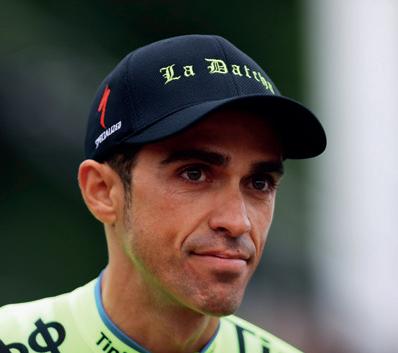
Work in pairs.
• Which of the sports from the box do you like?
• Which do you want to try?
badminton baseball fishing golf rugby skiing surfing
• Include all three points in your email.
• Write your email in a friendly style.

Work in pairs. Read the exam task. Decide how to follow the instructions.
Write an email to your English friend, Julie.
• ask her to go surfing with you at the weekend
• tell her what to bring
• say when you want to meet
Write 25 words or more.
Look at this email to Julie. Complete it with your own ideas.
Hi Julie, Do you want to go surfing ? I’ve got two surfboards, but you should a packed lunch. Let’s meet at at my house.
Now read this task and write your email.
You want to go horse riding on Sunday with your English friend, Sam.
Write an email to Sam.
In your email,
• ask Sam to go horse riding with you.
• say where you want to go.
• tell Sam what to bring.
Write 25 words or more.
• In this part, you talk to your partner.
• The examiner will give you some pictures with a question.
• Listen carefully to your partner’s answers and ask questions.
Work in pairs. What sports are in the pictures?


Listen to two students. What do they say about each sport? Complete the table with phrases from the box.
I don’t like it. I don’t understand it. I hate it. I like it. It’s boring. It’s exciting, but … I really like it. It’s fun. I’ve never tried it.
boy girl tennis football table tennis skiing baseball
Work in pairs. Do you like the different sports in the pictures? Say why or why not.
How often do you play / go …? Who do you play with?
Which is the best / most exciting / most boring … ?
It’s my favourite sport!
Read the text carefully, then underline the parts that give you the answers.
For each question, choose the correct answer.
Everyone in my family enjoys running – including me! But it’s sometimes hard for me to nd someone to run with. My brother and I sometimes run together, but he’s much faster than me. And my dad’s too busy to come at the moment. So my best running partner these days is my cousin Mandy. We go almost every day – it’s great! We don’t go running when it’s raining, but I still want to keep t on those days, so I go to the gym, or I play badminton with Mum. And sometimes I swim in the local pool. That’s what I like the most!
I also write a blog about running. I began writing it because I liked writing posts about where I go running, how I feel when I run, and the kinds of kit I like wearing. Now lots of people follow my blog, and they give me great advice! Some even say they started running after reading my blog, so that’s great!
Of course, not all my friends are interested in running, so I don’t ask them to come with me. But they can see it’s really important to me, and they always want to know about my latest runs, so that’s nice.
I’d like to improve my running so I can enter more races. I’ve done some local races, but I’ve never won anything – but that doesn’t matter. I’d really like to try a 25 km race soon. Everyone says it’s hard – but we’ll see!
1 Who does Holly usually go running with?
A her cousin
B her father
C her brother
2 What is Holly’s favourite way to keep fit when the weather’s bad?
A going to the gym
B swimming
C playing badminton
3 Why did Holly start writing a blog about running?
A to share her experiences of running

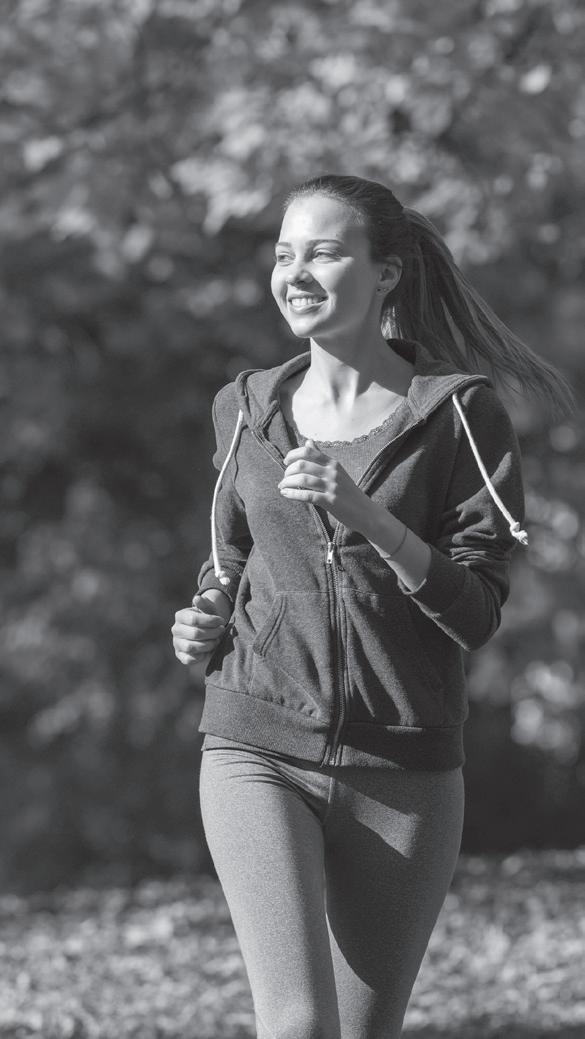
B to give advice to other runners
C to help other teenagers to start running
4 Holly says that her friends
A sometimes join her when she goes running.
B like asking her about her running.
C don’t really understand why she runs.
5 What does Holly want to do next?
A win a competition
B enter her first competition
C run in a diff icult competition
Fill in the table with the correct comparative and superlative forms.
adjective comparative superlative





1 big
2 heavy
3 hard
4 exciting

5 cheap
6 expensive
7 good
8 bad
bigger the biggest
Now complete the sentences with the correct form of the adjectives from Exercise 1a.
1 A tennis ball is than a table tennis ball – that’s very light.
2 This sports centre is I’ve ever been to – it costs a lot to get in.
3 Jon is at basketball than me. He’s in the school team and I’m not!
4 I think football is to play than other sports because there are lots of rules.
5 I bought racket in the shop because I didn’t have much money.
6 Snowboarding is much than skating – that’s boring!
Write at, in or on where necessary. Some words don’t need a preposition.
tomorrow
Saturday
summer
Exam candidates often make mistakes with prepositions of time. Correct the mistakes in each of these sentences.
1 We will go on the 5th October at the evening .
in the evening
2 I’m free in Monday afternoon.
3 I’m arriving 6.30 pm.
4 We can meet in 5 o’clock.
5 I had a nice time in my birthday.
6 At the first day, you should take a notebook.
Look carefully at each question and the options A, B and C before the recording starts.
For each question, choose the correct answer.
1 You will hear a boy talking to his friend about sports day at school. Why does he feel sad about it?
A He didn’t win his race.
B He lost his new sports shirt.
C He couldn’t do his favourite activity.
2 You will hear a girl talking to her friend about her new tennis racket. What does she say about it?
A It belonged to a family member.
B It was exactly what she wanted.
C It was quite expensive.
3 You will hear a boy telling a friend about his winter sports holiday. Which activity did he like best?
A skiing
B snowboarding
C walking in the mountains
4 You will hear a girl phoning her mum. Where is the girl now?
A at the gym
B at the pool
C at the park
5 You will hear a boy phoning a friend about the hockey match they’re playing in.
Why does he think their team may win the match?
A They have some brilliant players.
B They won against the other team before.
C They’ve done lots of practice.
It’s my favourite sport!

do, play and go with sports

Put the letters in the right order to make the name of a sport. Then circle do, play or go.
1 skallbbeta do / play/ go


2 blicmngi do / play / go
3 hekyoc do / play / go
4 doju do / play / go
5 flobtalo do / play / go
6 miscnytsga do / play / go
7 madnobtin do / play / go
Complete the sentences with the correct form of the verb, do, play or go.
1 Josh can’t come to your house. He tennis this evening.
's playing
2 Maria karate at the sports centre every Monday a er school.
3 My parents sometimes badminton together.
4 I running with my cousin tonight.
5 My teacher o en cycling at the weekends.
6 Would you like to gymnastics with me next week at the sports centre?
Complete the sentences with the nationalities.
1 Luisa is from Spain. She’s
2 Adriano is from Portugal. He’s .
3 Ravi is from India. He’s .
4 Agneta is from Sweden. She’s
5 Yumi is from Japan. She’s .
6 Nicos is from Greece. He’s .
7 Olivia is from Australia. She’s
8 Josh is from the USA. He’s
Look carefully at the verbs in the text, e.g. ask , say, tell. These tell you what to include in your answer.
Complete the email with the missing words.

I’ve got tickets to see a hockey match
(1) Saturday 16th January.
(2) you and your sister like (3) come with me? The match is (4) the stadium in town. It starts at 2.30 pm in the (5) . (6) me know! (7) you soon.
Now write an answer to this exam task. 2
You would like to go to the new sports centre in your town.
Write an email to your English friend, Olivia:
• invite Olivia to come with you
• tell Olivia when you can go
• say what you can do at the sports centre.
Write 25 words or more.


Match the sports with pictures 1–6.


Which sport from Exercise 1a is each sentence describing?

For this sport, you:
a hit the ball over the net with a racket.

b stand on a board with wheels on.

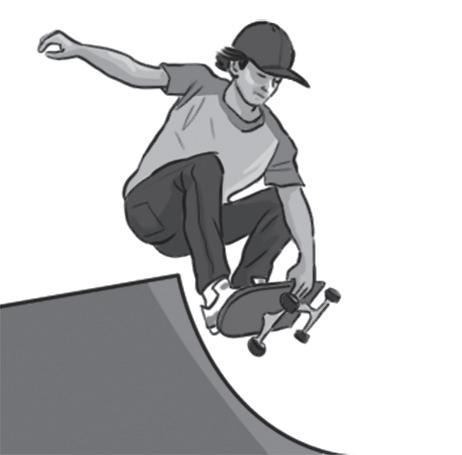
c need to go somewhere like a mountain.
d need a boat.

e can go on a road or round a sports field or track.

f hit the ball with a bat, and then run.
Find 11 more words connected to sport.
Teacher’s Book
WITH DOWNLOADABLE RESOURCE PACK
Listening Part 4: 3-option multiple-choice: listening to identify the main idea/message/gist/topic/point
Reading and Writing Part 3: 3-option multiple-choice: reading for detailed understanding and main ideas
Speaking Part 2, Phase 1: a discussion based on an artwork prompt. Focus is on organising a larger unit of discourse; comparing, describing, expressing opinions
Reading and Writing Part 6: an email: writing a communicative note or email of 25 words +
Grammar: comparatives and superlatives; prepositions of time (at, in, on)
Vocabulary: do, play, go with sports; nationalities
Pronunciation: schwa /ə/
Lead-in
Before students open their books, ask them what sport they do at school. Put them into pairs to discuss which of the activities they like and which they don’t like and why. Elicit ideas and have a class survey of the most and least popular activities.
1 Elicit the answers and drill the words, making sure students put the stress on the first syllable of each one. If the activities in the pictures weren’t mentioned in the lead-in, ask if students do these activities and, again, ask which they like and don’t like and why.
Answers
A football B badminton C basketball D judo E table tennis
2 Set a time limit of two minutes. Make sure students only write the names of sports they know in English. Elicit the sports.
3 Play the recording once and elicit the favourite sports. Play the recording a second time for students to listen for reasons why they like the sports and how often they play. Elicit adjectives that the two people use: fast, exciting, the best and time expressions: every week, every day after school.
Answers
Xuan: badminton, Paolo: football
Track 31
Boy: Hi. What’s your name?
Xuan: Hello! I’m Xuan.
Boy: And what’s your favourite sport?
Xuan: I love badminton – it’s really fast and exciting. I play it in the sports centre every week.
Boy: And what’s your name?
Paulo: I’m Paulo.
Boy: What is your favourite sport?
Paulo: Football! It’s the best.
Boy: How often do you play it?
Paulo: Every day after school.
4 Tell students to take turns to ask the questions. When they have finished, tell students that, in the speaking exam, there may be a general question such as: Tell me about a sport you like to play. Their answer to this question could include what the sport is, why they like it and where and how often they play it.
Put students into pairs. Ask them to think of a different general question about sports e.g. Tell me about a sport you like to watch on television. Tell me about a sport you don’t like. Change the pairs. They take it in turns to act as the interviewer.
Reading Part 3
Lead-in
Talk to the class about sports that they can do in after-school clubs, either run by the school or in their town. Have a class survey of who practises a sport or activity after school.
Lead-in
Look at the exam advice and tell students to look at the photo and the heading as well as any words in bold. Elicit that the text is an interview about a gymnast’s life.
1 Discuss the two questions with the class. Point out that they can train alone e.g. by jogging regularly. Elicit that the teacher who helps you get better at a sport is called a trainer.
2 Encourage students to make a note of the words: gymnast / gymnastics. Elicit answers to the questions from students.
3 Remind students about the exam advice. Set a time limit of five minutes.
With books closed, elicit a sport e.g. football and write the word in the middle of the board. Elicit adjectives which students can use to describe it. Make a mind map by writing the adjectives around the word football on the board and leave this on the board until the Extension activity after Exercise 3. Students now work in pairs or small groups to do the same for a different sport. Tell them all to write the adjectives they think of.
1 Allow students to work in pairs to discuss their ideas. Elicit ideas but don’t say what the correct answers are until they have listened. When they have listened to the recording, ask who they agree with; the person who prefers football or basketball.
Track 32
Boy: Why do you like football so much? Basketball is better.
Girl: No, it isn’t. Football is the best game in the world.
Boy: But basketball is faster and more exciting.
Girl: You’re joking! Football is a much more interesting game than basketball.
Boy: Ha ha! Why do so many football games finish 0–0?
Girl: Because scoring a goal is harder than scoring a basket.
Fast finishers
Students should find the parts in the text which show why the other two choices are wrong. When you elicit the answers, these students can say why the incorrect choices are wrong.
Extension idea
Put students into pairs. Tell them to choose a sport they like/do. When they have thought of one, they take it in turns to interview each other, using the four questions in the reading.
Workbook page 20
Boy: In basketball, they often score more than 60 points in one game!
Girl: Yes, I know. But football is the most popular game in the world.
Boy: I don’t understand why! Basketball is cooler.
2 Look at the rules with students. Look at Exercise 1 and elicit which two things are being compared in 1, 3, 4, 5 and 7 (1, 3, 4, 7 football and basketball; 5 scoring a goal and scoring a basket). Then ask which groups the superlatives refer to in 2 and 6 (all the games in the world). You could also refer to the spelling rules in the Grammar reference section page 113.
It’s my favourite sport!
3 Look at the example with students and elicit what the mistake is (using more with a superlative form instead of most) and why it is a superlative (the speaker isn’t comparing rugby to one other sport but to all sports). Allow students to work in pairs to correct the sentences and say what the problems are.
Answers
2 faster 3 best 4 the slowest 5 the most popular sport
6 easier
Tell students to look at question 4 and make similar sentences about people in their class but positive ones, e.g. Juan is the tallest person in the class Isabel is the best basketball player in the class.
Students could do Grammar reference: Comparatives and superlatives, Exercises 1–2, page 113, at this point or for homework.
Tell students to look at the sport they thought of at the beginning of the lesson and the adjectives they wrote. Give them three minutes to write comparative and superlative sentences for their sports. Elicit ideas from different groups or pairs, e.g. I think that swimming is healthier than jogging. Depending on the adjectives elicited, this could be an opportunity to check the spelling rules.
/P/
4 Before students listen to the sentences, model the schwa sound on its own. Play the recording once and then say each word which contains the schwa sound to model the sound again. Allow students to practise saying the sentences before they listen again. Play the recording, and drill each sentence.
Track 33
Basketball is better. Scoring a goal is harder than scoring a basket.
5 Tell students to work in pairs and to say the sentences, trying to listen to where there is a schwa sound. Elicit their ideas then model and drill the sentences in sections, making sure students say the schwa sound correctly: I’m a / faster / runner / than your / brother. / Mike is a / better / basketball player / than me./
1 I’m a faster runner than your brother
2 Mike is a better basketball player than me.
6 Look at the box with students and elicit some comparative adjectives that they could use for each topic. Set a time limit of two minutes for students to work together to add more adjectives. Look at the example dialogue with students and give them two or three minutes to have similar conversations.
Grammar reference SB page 113: Comparatives and superlatives
Workbook pages 20–21
Write judo / karate and baseball / cricket on the board. Put students into small groups and ask: What do you know about these sports? What are the main similarities and differences between each pair. Set a time limit of two minutes and elicit any ideas they have.
Before students look at the first exercise, ask them to stay in their groups and describe what they can see in each photo, how they think the people are feeling and which sports students would prefer to do. Elicit ideas from groups.
1 When students have done the matching, ask them to compare the three sports using comparative and superlative adjectives from the last lesson e.g. Cricket is more boring than judo. Rock climbing is the most dangerous of the three sports.
Answers 1 C 2 B 3 A
2 When students have looked at the rules, elicit or tell them that we also play sports which have something like a ball e.g. badminton has a shuttlecock, ice hockey has a puck. There are one or two activities ending in - ing which we use with do (boxing, wrestling).
Answers 1 play 2 go 3 do
3 Allow students to do this in pairs. Elicit the answers and reasons why e.g. baseball is a ball sport, judo is a non-team sport and running ends in - ing
Answers play: baseball, volleyball; do: judo, yoga; go: running, surfing
4 Look at the example dialogue with the class. Ask why the first question uses play and the second question uses do (football is a ball game, yoga is a non-team activity). Ask what grammar form the speaker uses in their third answer (a comparative adjective). Elicit or point out that we could also use a superlative form here: Running is the cheapest sport. Set a time limit of five minutes for students to think of ideas and practise their conversations. Monitor and help where necessary.
Put students into small groups. Ask one group to choose a sport or activity and mime it. They can use one or more person in the mime. Tell the other students to put up their hands when they have guessed the activity. They then have to form a present continuous sentence with the correct verb e.g. You are playing football. If they do this correctly, they win a point. If not, a different group can guess.
Workbook page 22
Listening Part 4 SB page 39
Lead-in
Put students into small groups. Write on the board: Buying clothes for sports. Ask the class what they think is important when buying sports clothes and why e.g. comfortable, look good, cheap and where they go to buy them.
1 Look at the instructions. Elicit ideas from students and then ask students to choose one word which they think is the most important. Elicit ideas and reasons e.g. Why : the answers all start because, so the reason is the important information to listen for.
Answers
You will hear a girl talking to her friend about a pair of shoes. Why does she buy them?
2 Tell students to ignore the options in Exercise 1 for now and concentrate on the questions in Exercise 2. Elicit the answers.
Answers
1 the girl’s friend 2 no 3 training
Track 35
Narrator: You will hear a girl talking to her friend about a pair of shoes. Why does she buy them?
Girl: Hey, Pedro. Look – what do you think of these shoes?
Boy: They look comfortable. But that colour is horrible.
Girl: Oh, it’s not too bad. Anyway, they’re for training – not for school, or going to parties.
Boy: Well, if you want them for training, they’re fine. The colour isn’t important.
Girl: You’re right. I’m buying them!
3 Tell students to look at the choices in pairs and try to decide which is the correct answer. Don’t elicit ideas yet. Play the recording again and elicit the correct answer and why the other choices are wrong (A – the price isn’t mentioned B – She says: it’s not too bad but not that she likes it. C – they’re for training).
Answer
Look at the exam advice with students. Elicit that there are three choices to choose from.
4 Set a 45-second time limit for students to look at the key words. Encourage them not to choose more than one or two for each question. Don’t elicit ideas before playing the recording. Answers
Extension idea
Make a photocopy of the audioscript and ask students to look at the reasons why the two wrong options were incorrect. Elicit that the information in the options is often mentioned but in a way that shows it is the wrong choice e.g. 3 A You just had breakfast.
Narrator: For these questions, choose the correct answer.
2
Narrator: You will hear a football manager talking to his team at half-time. What does he want them to do?
Man: OK, you are playing really well – and that’s good. I just want you to think a bit more about what you’re doing. It’s great to see you trying to get the ball. When you get it, try to keep it for a while. Don’t give it to somebody else immediately, and don’t just run towards the goal. Play a slower game.
3
Narrator: You will hear a woman talking to her son. Why doesn’t she want him to go out?
Woman: Are you going out on your bike now, John?
Boy: Yes – I’m training for the race on Saturday. It’s not raining.
Woman: I know, but it’s very early. You just had breakfast, and it’s still dark!
Boy: That’s OK – the roads are quiet.
Woman: I don’t like you going out when people can’t see you properly.
Boy: I’ve got lights, Mum.
Woman: I don’t think that’s enough.
4
Narrator: You will hear a woman talking about surfing. What advice does she give to someone who wants to start the sport?
Woman: Well, the first thing I’d say is get the best board you can. The cheap ones are no good. Then be ready to make a lot of mistakes – it takes time and practice to be a good surfer. You can do it without a teacher, though – there are plenty of good lessons available on the internet.
Narrator: You will hear a girl talking about running. While she’s training, what does she think about?
Girl: When I’m training, I feel like I’m in my own little world. I don’t worry about winning the next big race, or trying to run faster than before. That’s only for the competitions. I just enjoy the beautiful countryside and the clean air. I might think about what to have for dinner, or what’s on TV that night – anything, really.
Workbook page 21
Grammar SB page 40
Prepositions of time: at, in, on
Lead-in
Ask students to think of one Olympic athlete who they know something about. Put students into small groups to discuss the athletes and what they know. If possible, allow students to research their athlete online so they have some information to share with their group. Elicit one sportsperson that each group discussed and why they like them.
Background information
Yusra left Syria in 2015. She travelled through Lebanon to Turkey and then by dinghy to Greece. When the boat stopped working, Yusra, her sister and two other refugees swam and pushed the boat and saved the lives of the 20 people on board.
Yusra has talked at the UN, met Barack Obama and the Pope and is now a global ambassador for the UNHCR, the United Nations refugee agency.
1 Tell students to look at the picture and, without looking at the text, guess where she is from and the connection between her and the word refugee. Set a time limit for students to find out the information and the answer to the question in the book, (she is from Syria and she is a refugee living in Germany now; she didn’t represent a country at the Olympics, she represented people who are refugees).
Answers
Every morning at 6 am, every afternoon and at the weekend
2 Elicit the rules. Elicit or point out that when we have a day of the week and a time of day, we use on e.g. on Saturday morning; we say at night ; we don’t use prepositions of time with yesterday, tomorrow or expressions with next / last ; in American English, we use on the weekend.
Students could do Grammar reference: Prepositions of time: at, in, on 3–4, page 114, at this point or for homework.
Answers
1 at 2 in 3 on
3 If you think students need more help, look at the example and elicit alternative questions and answers from the class, e.g. When are the school holidays? They are in July and August. When do you have English classes? On Tuesdays and Thursdays. Set a time limit of two minutes for students.
Students think of one or two more questions that they could ask. When everyone has finished the exercise, allow these students to ask the class their questions.
Tell students to write down some of their answers from Exercise 3 on a piece of paper e.g. on 13 June, at 6.30, in July. Collect the answers and redistribute them randomly. Students think of questions which match each answer e.g. When is your birthday? What time do you wake up? When do you go on holiday? When they have finished, students mingle and ask each other the questions to try to find out whose answers they have got.
Grammar reference page 114: Prepositions of time: at, in, on Workbook page 21
Lead-in
Split the class into two groups: A and B. Divide these groups into pairs. Set a time limit of one minute. A pairs write as many countries as they can in English. B pairs write as many nationalities/languages as they can. Now put A and B pairs together in groups of four. They share their information and try to match countries, nationalities and languages.
1 Tell students that one of the missing words is in the text in the previous section. Allow students to work in pairs and elicit the answers.
Answers
1 German 2 Syrian
2 Look at the table with students and elicit that sometimes they can just add a suffix e.g. America – American, but sometimes they will have to make other spelling changes to the country words, not just add the correct suffix e.g. England – English. Allow students to work in pairs and check the spellings of each word when you elicit the answers. Elicit that in English both countries and nationalities are written with a capital letter.
Answers
1 Indian 2 Italy 3 Mexican
4 China
5 Japanese
6 Portuguese 7 British 8 Irish 9 Spain 10 Swedish 11 France 12 Greek
3 Look at the example questions and answers with students. Give a time limit of two minutes for students to ask and answer the questions. Elicit the questions and answers from the class.
Ask each student to write down the name of a famous person from a different country. Put students into groups of four and tell them not to show each other their famous person’s name. They take turns to guess each other’s person using the same question form as in Exercise 3.
Workbook page 22
Lead-in
Write surfing on the board. Elicit what clothes or equipment you need to go surfing e.g. surfboard
Ask if anyone in the class goes surfing and, if so, elicit questions from other students about where they go, what it’s like, how easy or difficult it is etc. Now put students into small groups and tell them to do the same with horse riding. Set a time limit of two or three minutes and elicit ideas from different groups of what to bring (e.g. clothes – hat, boots.).
1 Encourage students to use adjectives to describe the different sports and comparatives and superlatives to compare them e.g. I’d like to try fishing. It’s more relaxing than the others and exciting when you catch a fish.
Writing Part 6 (writing short messages)
Discuss the information with students and elicit examples of ‘little words’ that could be tested e.g. prepositions (on, in, at), articles (a, the), auxiliary verbs (do, be, have)
2 Tell students to cover Exercise 3 so that they don’t get any ideas from that. Elicit the first thing they would do in their email e.g. say hello. Allow two minutes for students to think of what is needed. Elicit ideas.
Suggested answer
Say hello, ask her about going surfing (Would you like / Do you want), tell her what to bring (e.g. swimming costume, towel, warm clothes) say when you want to meet (e.g. in the morning, at 9 o’clock)
3
Tell students there is no correct answer as long as it is grammatically correct. You can set rules for the gaps e.g. one word only or a maximum of three words or leave it up to students. Remind students that the task in the exam isn’t to complete a note like this but to write the whole thing.
Possible answers
tomorrow / on Saturday / at the weekend; bring; nine o’clock
4 If you think students need more help, allow them to discuss their ideas as you did in Exercise 2 before they start writing. When they are ready, set a time limit of five minutes for students to write their email. Remind students to read their emails and check for mistakes. When students have finished, put them in pairs and ask them to read each other’s notes to see if they can spot any mistakes.
Fast finishers
Tell students to think of a new set of instructions for a different activity using three bullet points as in Exercises 2 and 4.
Possible answers
Hi Sam, Would you like to come horse riding with me on Sunday? I want to go riding in the fields behind our house. You can ride Misty, my mum’s horse. Don’t forget your hat and boots! See you then,
NikiExtension idea
If any students finished early and wrote a new set of instructions, collect these and choose one to dictate to the class for them to write an email for homework.
Writing Bank page 139: Writing Part 6
Workbook page 22
Lead-in
Put students in small groups. Give them one minute to find a sport or activity that none of them have tried before. When they are ready, they imagine that someone asks them to do this activity and they discuss what their reactions would be e.g. No way!
It’s dangerous; Yes, that sounds really exciting. Elicit the activities students discussed and their reactions.
Speaking Part 2, Phase 1 (a discussion based on an artwork prompt)
Look at the advice with students. Tell students that the examiner won’t interrupt unless they can’t think of anything to say. It is important that this doesn’t happen because the examiner wants them to discuss something together. Elicit that it is useful to ask each other questions because it gives students more to talk about and shows the examiner that they can form questions correctly.
1 Tell students that, in the exam, they will have just a few seconds to look at the pictures and think about the English words for what they can see. Say: If you don’t know what the word is you can describe or explain it, for example, ‘I’m not sure what this sport is called. It’s popular in America. They hit a ball with a bat and run.’ (baseball). Tell students to imagine that they don’t know the names of the sports in the pictures. Elicit how students could describe them.
Answers
A tennis B basketball C table tennis D skiing E football
2 Look at the phrases with students. Point out that I’ve never tried it is a new structure. Tell them you won’t look at how other verbs are formed in this tense now. They should just use this phrase for something they don’t do now and never did in the past. Also elicit how they could finish the sentence: It’s exciting, but … (e.g. it’s dangerous/expensive.). Play the recording twice if necessary. Elicit the answers.
Answers tennis: girl – It’s fun football: boy – I like it.; girl – I don’t like it. table tennis: girl – I really like it.; boy – It’s boring. skiing: girl – I’ve never tried it; boy – It’s exciting, but … baseball: boy – I don’t understand it; girl – I hate it.
Track 37
Examiner: Do you like these different sports? Say why or why not.
Girl: What are these sports?
Boy: This is tennis, and this is football.
Girl: Right, and this is table tennis, I think, oh and skiing!
Boy: And baseball! So do you like playing tennis?
Girl: Yes, I do.
Boy: So do I. Why do you like it?
Girl: It’s fun!
Boy: OK. What about football? I like it because I play with my friends. We play on Wednesdays in the park. And you?
Girl: No, I don’t like it.
Boy: Why not?
Girl: I don’t like team sports. And do you play table tennis?
Boy: No, it’s boring.
Girl: Oh? I really like it.
Boy: Why?
Girl: I play with my mum! She’s really good.
Boy: Now what about skiing. Can you ski?
Girl: No. No , I’ve never tried it. It looks cold!
Boy: Oh. I can ski! We go to the mountains and we ski. It’s exciting, but it is very cold!
Girl: Do you like baseball?
Boy: Not really. I don’t understand it. We don’t play it in my country. What about you?
Girl: No, I hate it.
3 Look at the example questions with the class. Elicit or tell students that they could first ask: Do you ever play / go …? and then only ask the next two questions if the answer is Yes. Tell students to ask each other about the seven activities and then discuss the last question (using comparatives) together, giving reasons for their answers.
Put students into groups of three so that they can take turns in playing the part of the examiner. Each examiner decides what to ask about the seven sports; one of the questions they discussed in Exercise 3 or a new one if they can think of one. Students do the same as in Exercise 3 but this time with an examiner listening. After each student has played the role of the examiner, they give the two students feedback.
Speaking bank pages 146–147: Part 1
Complete Key for Schools new edition Test Generator Unit 5
Sports
badminton basketball football
judo table tennis
do / play / go with sports do karate judo gymnastics yoga
play baseball hockey cricket volleyball
go running surfing climbing skating
Countries – nationalities
Australia – Australian
Britain – British
China – Chinese
France – French
Greece – Greek
India – Indian
Ireland – Irish
activity 1
Italy – Italian
Japan – Japanese
Mexico – Mexican
Portugal – Portuguese
Spain – Spanish
Sweden – Swedish
Put students into small groups. Tell them that you are going to think of a word and give them five clues. They can only have one guess. If they guess the word correctly after the first clue, they get 5 points but, if they are wrong, they are out. After two clues they get 4 points, 3 clues – 3 points, 4 clues – 2 points and 5 clues – 1 point. After each clue, the groups decide whether to guess and risk being wrong or wait for another clue and hope that no other group guesses correctly.
e.g. sports:
Clue 1: We play it with a ball. (Ask if anyone wants to guess.)
Clue 2: It is a team game. (Ask if anyone wants to guess.)
Clue 3: Players hit the ball. (Ask if anyone wants to guess.)
Clue 4: It is an American game. (Ask if anyone wants to guess.)
Clue 5: Players wear a special cap. The cap has the same name as the sport. (This is the last chance for groups to guess.) The answer is baseball.
Ask each group to find another word from the wordlist and write five clues of their own. The groups then take it in turns to give their clues to the class as you did in the example.
Vocabulary activity 2
Put students into small groups and give each group a number. Tell students that they have to define a word from the list e.g. Football – it’s a sport with two teams who try to score goals by kicking a ball. They then choose three key words from their definition and write these on a blank piece of paper (e.g. sport, goals, kicking) and add their group number. Collect the key words and place them around the room. Students walk round the classroom and try to guess each word from the key words written. When they have finished, elicit guesses and ask the groups who wrote the key words if the guesses are correct.